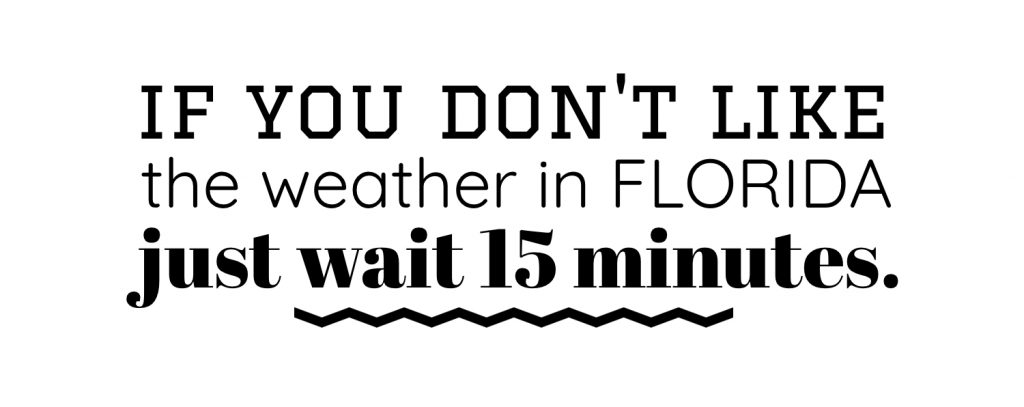Everyone knows that in Florida, it rains a lot. And rain means wet roads that can be a major hazard to driving.
Florida is touted as being a beautiful, sunny paradise, but it never fails to still strike fear into its residents and tourists with its infamously unexpected and dangerous rainstorms. We at The Eberst Law Firm don’t doubt your ability to be able to drive safely in Florida’s fickle weather, but we invite you to read our below article for some tips and laws that apply to driving on Florida’s potentially hazardous roads. After all, according to the US Department of Transportation, there are nearly six million vehicle crashes annually and over a fifth of these crashes (that’s 1.2 million) are due to weather-related conditions.
What makes Florida weather so dangerous when driving?

“If you don’t like the weather in Florida, just wait 15 minutes”. This common expression amongst local Floridians certainly carries weight, as Florida’s sunny skies can moments later turn into a downpour that has both you and your car trembling.
Below are some issues that can arise when driving in Florida, along with some tips on how to handle these potentially nerve-wracking situations.
- Decreased Visibility- Rainstorms can wreak havoc on your visibility as a driver, and you want to ensure that you are always properly maintaining your vehicle so that you are prepared. Make sure that your wipers are always working and are in good shape. Check your headlights to make sure that they are clear, bright, and working. Only proceed through intersections if you can fully see the traffic signal, being careful not to risk running red lights.
- According to Florida Law, Statute 316.217(1)(b), any vehicle operating on a highway during rain, smoke, or fog must have its headlights and taillights on. This is not only important for legal reasons, but also for practical purposes as it illuminates your vehicle making it easier for others to see you and helps you as you navigate through treacherous terrain.
- Dangerous Flashers- It is already terrifying enough going through unexpected rainstorms, especially on high speed roads like the highway; always resist the urge to put on your flashers when in this situation. Not only is it distracting and dangerous to be going 10 mph on the highway with flashing lights, it is also illegal. Be sure to follow the other safety guidelines that are outlined in our article about safe driving on the high-speed roadways.
- According to Florida Law, Statute 316.2397(7)(a), flashing lights are forbidden on vehicles except when their intent is to show that a vehicle is either lawfully stopped or disabled on the highway. If you ever feel the urge to flash your car’s lights when going through a rough rainstorm, pull over instead and consider waiting for the storm to pass. You can then use an app on your iPhone, such as MyRadar NOAA Weather Radar, to track the weather to see when the storm is going to pass.
- Chance of Hydroplaning– Most of us are taught in Driver’s Ed that the road is most dangerous right after it begins to rain, but it is important to remember this piece of knowledge, especially as a rainstorm is brewing. Hydroplaning is so dangerous because it is caused when the oil from the road mixes with the water, causing a very slick surface that makes it very easy for your car to slide around and potentially crash. It is especially terrifying because it can cause someone to lose control of his or her vehicle.
- Many actions can be taken to reduce the risk of hydroplaning: make sure your tires are always inflated and have sufficient tread, drive slowly on wet roads and always keep your eye ahead on the flow of traffic so you allow proper distance between your car and others’ cars, avoid driving on areas where water is pooling, drive in tracks created by other vehicles, and avoid turning and/or braking quickly. Additionally, be extra cautious of pedestrians and motorcyclists, as you would not ever want to lose control of your vehicle and crash into these vulnerable individuals.
- Debris Caused by Bad Weather – Florida is well known as being a state that must continually deal with the damage caused by extreme weather. Hurricanes are so ingrained with our state’s culture that we use them as mascots. Intense Florida weather is known to cause dangerous driving conditions not just through the danger of water-soaked roads but through the debris that this water and debris can clutter roads with. Car accidents can occur when a vehicle runs over or into debris that can damage the car or distract a driver. Some debris can be sharp and have the potential to pop a tire leading to loss of control. In other cases, debris carried by high winds can block a windshield or regular debris can hit the windshield at high speed. Trees can sometimes topple over and block roads or cover them in large branches.
- It falls to the entity in charge of the road’s maintenance to make sure that it is clear of dangerous debris. When someone is involved in a car accident caused by debris on a road, a car accident injury claim can find those in charge of making the road is clear, such as the government or a private entity, liable for the injuries caused by the accident.
Assigning Liability in Weather-related Crashes in Florida
Be sure to always follow the above tips when driving in Florida’s hazardous weather, as you don’t want to give your insurance company or police officers any reason to assign you a percentage of liability for a car crash. Police reports, witness statements, weather reports, dash cams and more will all be analyzed in order to determine who is liable for a crash. However, it is important to remember that more than one person can be held accountable for a car crash in Florida, and this term is known as comparative negligence. For instance, if it is raining heavily outside and you crash into the rear of a car without its headlights on, both you and the other party could be held accountable as both actions could arguably have contributed to the crash.
Seeking Legal Help after a Weather-related Crash in Florida
Instead of playing the game of “he-said, she-said” with the other party and insurance companies, put your worries aside and let us a The Eberst Law Firm fight for you.
It is highly important to consult with an experienced attorney in the aftermath of a weather-related car crash, as the intricate details and laws that surround these claims will need to be strategically analyzed and presented to the insurance companies and potentially to the court. At The Eberst Law Firm, we are well versed in weather-related car crashes, and we will always fight to make sure that the unique facts of your case are accurately portrayed and that you receive the fairest, best settlement achievable. Contact us by calling 772-225-4900 or contact us online to schedule an easy, no-pressure consultation to discuss your case.
About the Author of this Page: The above information was written or reviewed by one of the attorneys at The Eberst Law Firm who have extensive experience trying legal cases outside and inside courtrooms throughout Florida. This article was also extensively researched to ensure that all information is accurate and up to date. If you want to know more about the author of this page, view our attorney bios here.
Sources
https://itunes.apple.com/us/app/myradar-noaa-weather-radar/id322439990?mt=8
https://ops.fhwa.dot.gov/weather/q1_roadimpact.htm
https://eberstlaw.com/right-on-red/
https://eberstlaw.com/5-weird-florida-road-laws/

